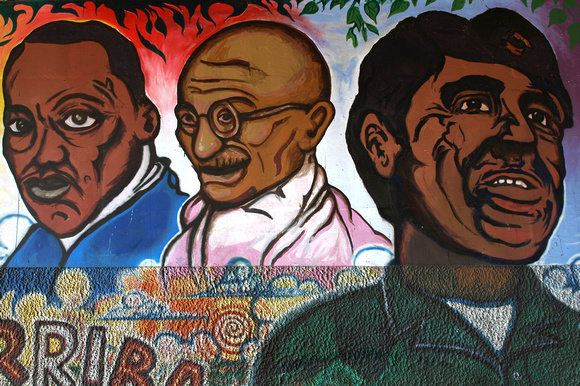By: Ian Davis
Last week, as I sat in my bedroom watching Dr. Martin Luther King, Jr.’s “I Have A Dream” speech, a multitude of thoughts came forth into my mind. Without question, I pondered upon MLK’s provocation of the ‘sweltering injustice’ and racial inequality that plagued our nation, and was forced to consider how the 21st century confronts these still persistent quandaries. Has our valiant nation honored the obligation to life, liberty, and the pursuit of happiness for all men? Or have we squandered the foundations that have made our United States so great? And why do we lack the great non-political leaders today that can incite worldwide movements? Of all these musings, this final one stuck with me.
The likes of Martin Luther King, Jr., Mahatma Gandhi, and Cesar Chavez seemingly evade us in the 21st Century. These were leaders who went beyond their individual struggle so that they could lend a voice unto the people in order to enact change. These were and still are role models who were not directly involved in politics, had no desire to accept anything short of their goals, and came from comparatively meager backgrounds. Above all, they were activists who deplored violence and sought to mend the inequality brought about by fellow man. All of these leaders were at the forefronts of grand movements, movements that sought to right a wrong. So why are we now bereft of a Palestinian Gandhi? When will the compromised immigrants of Europe mobilize around a Cesar Chavez?
The agitating response of ‘we live in a different time’ is appropriate. In the year 2013, the most visible people in society are politicians and celebrities. As realpolitik dictates, states, and subsequently politicians, wield the only substantial influence in our global order. This notion perpetuates today, as a plethora of news sources focus almost entirely on politicians and their doings. Presidents, legislators, justices, mayors, parties, ministers, the list goes on and on. These actors are, of course, of paramount importance, yet the media’s intent to focus such a great deal of attention on them numbs the populace’s perception of whom and what is important.
But of even greater influence is the overload of information to which common people have access. In the times of MLK and Gandhi, people had to have a vested interest to accumulate knowledge. If one wanted to acquire information, they were forced to devote their time in discovering it. They had to go to the library, talk to another person, or even find it out for themselves! Essentially, an individual had to be wholly committed to attaining said facts. But in 2013, one needs no investment to accrue new material. The spread of information is an effortless action. To learn something new, all one needs is the internet. A simple Google search and the world’s accumulated knowledge is at your fingertips. In this regard, conquering new information is no big deal. But in 1962, after a young black man allocated his time to learn about the American Constitution in relation to contemporary segregation laws, he was likely to become empowered by his awareness and subsequently act upon it, namely by promoting the ideals of someone who shared his belief. In this way, figures like MLK and Chavez gained notoriety, yet it was weighted notoriety. It was a fame that was based on a revolutionary idea, the charisma that carried it, and the associated responsibility. But today, the act of garnering information has numbed our ambition. When you hardly have to work for the knowledge you crave, you are less likely to act upon it, to emphatically call upon someone else to discuss it, or explore it further.
But to write off the rapid spread of information as entirely handicapping to society would be hurried. The mobilization of people is incredibly aided by the inter-connected matrix that unites the globe. Events such as the Arab Spring would have been impossible without such a massive spread of time sensitive information. The ‘effortless’ spread of ideas amassed millions of people into the streets of Cairo, Damascus, Amman, Tripoli and countless more. Without this information overload, such a revolutionary movement would never have been conceived.
Let us consider a social movement with similar beginnings: Occupy Wall Street. Coupled with the social grievances of like-minded youth, the internet helped consolidate the movement and its organization. However, some blame the long run ineffectiveness of the group on its obvious void of a spokesperson and non-political leader that could incite a worldwide movement.
I do not doubt that Occupy protesters cared about the movement they dedicated their time and energy into. It is the public perception of the movement that I question. Not does the public agree or not, but rather how do they identify them. In our generation of overload, we are exposed to far too many things to passionately attach ourselves to movements, protests, and leaders in the full force of MLK’s era.
Thus, we are at a crossroads. The innumerable amount of information weaved together by the internet connects us and enables us to share our similar and dissimilar ideas. Mobilization may be easier today than it has ever been, yet we are bereft of genuine faces that represent these calls for change. For better or for worse, this is the situation generation overload faces today.

